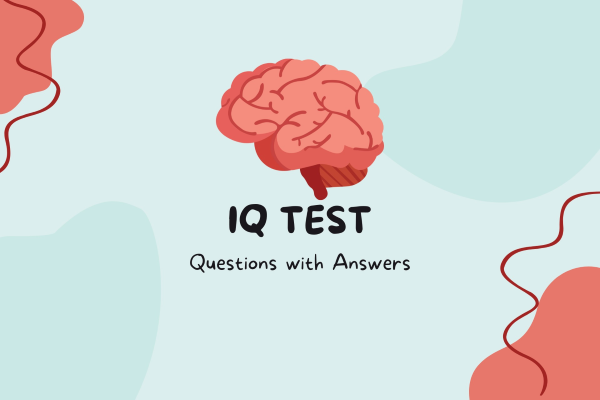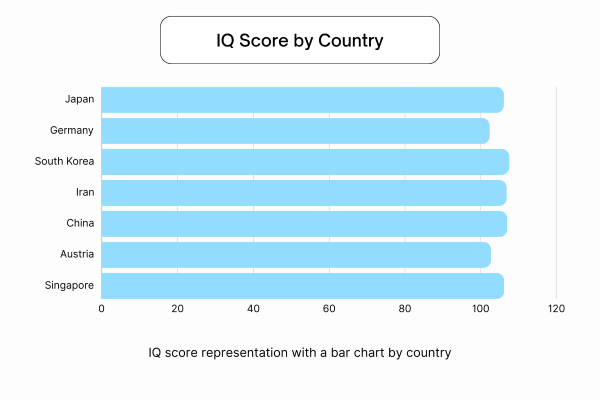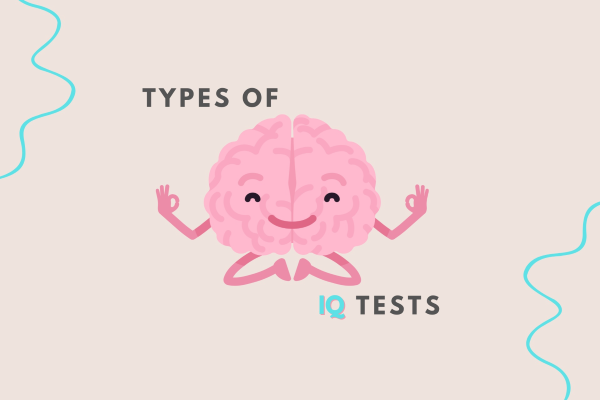Are you interested in your IQ level? If yes, then consequently, you may have attempted to take different IQ tests? Well, different types of IQ tests include a variety of questions of different characteristics. In this blog post, you will learn about the purpose of IQ tests and therefore, the different types of intelligence assessment tests, and we will provide you with IQ test questions with correct answers of different characteristics.
What is the Purpose of IQ Tests
The primary purpose of IQ tests is to measure the intelligence quotient of participants. IQ tests assess the intelligence of people in different aspects of intellectual functioning, such as abstract thinking and analytical thinking, memory retention abilities, spatial abilities, and so on. IQ tests, when used in education, are a good way of estimating people’s learning capacities. Overall, these tests help to identify individuals with special intelligence possession and learning abilities. Therefore, IQ test questions are designed to compare the answers of participants of the same age group and classify individuals into different intelligence levels.
However, IQ test results are not fatal. Nevertheless, over time the intelligence level of people changes under the impact of different circumstances. The IQ score highly depends on the mental and physical state of the test taker, so the IQ test accuracy is relative.

40 IQ Test Questions with Answers
IQ test questions differ, as they refer to different categories and cover a wide range of cognitive abilities, focusing on numerical reasoning, logical reasoning, pattern recognition, and so on. There are different types of IQ tests, such as the Mensa IQ test, and they include logical questions, analytical questions, inductive reasoning questions, deductive reasoning questions, etc. Hence, let’s take a look at several examples of IQ test questions and answers.
Numerical Reasoning
Which is the missing number?
- 2, 4, 6, 8, …
- 9
- 10
- 12
- 7
Answer: 2
- 5, 10, 15, …, 25
- 16
- 30
- 20
- 0
Answer: 3
- 3, 6, 9, …, 15, 18
- 12
- 10
- 13
- 11
Answer: 1
- 1, 4, 9, …, 25, 36
- 10
- 16
- 20
- 18
Answer: 2
- 2, 6, 12, 20, …
- 22
- 26
- 28
- 30
Answer: 4
- 10, 20, 30, …, 50
- 40
- 45
- 35
- 49
Answer: 1
- 1, 4, 9, 16, …, 36
- 26
- 20
- 18
- 25
Answer: 4
- 3, 5, 8, 12, …, 20
- 17
- 16
- 18
- 15
Answer: 1
- 2, 6, 18, 54, …
- 78
- 162
- 96
- 84
Answer: 2
- 7, 10, 14, …, 22, 28
- 16
- 20
- 19
- 18
Answer: 3
Critical Thinking Question
- If all oranges are fruits plus all fruits grow on trees, therefore can we say that all oranges grow on trees?
Answer: Yes, we can.
- If some cats are black, and all black cats are mischievous, hence can we conclude that some cats are mischievous?
Answer: Yes, we can.
- If penguins can not fly, but all birds fly, thus, can we conclude that penguins are not birds?
Answer: No, we can’t, as penguins biologically are classified as birds.
- If all cars have wheels, and some vehicles have wheels, hence, can we conclude that some vehicles are cars?
Answer: No we can’t, as not all vehicles with wheels have to be cars.
- If some dogs are white, and all white dogs are friendly, hence, can we conclude that some dogs are friendly?
Answer: Yes, we can.
- If all mammals have hair, and whales are mammals, hence, can we conclude that whales have hair?
Answer: No, we can’t, as whales, like some other mammals have equally little or no hair.
- If all the students in the class passed the math test, and Ann is a student in the class, therefore, can we conclude that Ann passed the math test?
Answer: Yes, we can.
- If some apples are green and all green fruits are sour, hence, can we conclude that some apples are sour?
Answer: Yes, we can.
- If all roses are flowers, and all the flowers need water to grow, thus, can we conclude that all roses need water to grow?
Answer: Yes, we can.
- If all squares are rectangles, and rectangles have four sides, thus, can we conclude that all squares have four sides?
Answer: Yes, we can.
General Knowledge Questions
- Who was the first person to set foot on the moon?
Answer: Neil Armstrong
- What is the capital city of Germany?
Answer: Berlin
- Who wrote “To Kill a Mockingbird”?
Answer: Harper Lee
- Who is the author of “1984”?
Answer: George Orwell
- Write down the chemical symbol of water.
Answer: H2O
- What is the currency that is used in China?
Answer: Chinese Yuan
- Name a planet in the solar system that is known as “The Red Planet”?
Answer: Mars
- Who was the painter of the Mona Lisa?
Answer: Leonardo da Vinci
- Who is the physicist that is known as the father of modern physics?
Answer: Albert Einstein
- What is the name of the mountain that is the highest on Earth?
Answer: Mount Everest
Sequential Reasoning Questions
- 2, 4, 8, 16, …
32, as the numbers in the sequence double.
- 3, 6, 12, …, 24
18, as each number gets multiplied by 2.
- A, C, E, …, I
G. As the sequence skips one letter in the alphabet, therefore, the missing letter is G.
- 1, 4, 9, 16, …
25, as each number represents a perfect square.
- Monday, Wednesday, Friday, …, Tuesday
Thursday. We have all weekdays, thus, the missing one is Thursday.
- Red, Blue, Yellow, …, Green
Orange, the order of colors in the rainbow.
- Circle, Square, Triangle, …, Pentagon
Hexagon, the order of polygons, based on the number of sides.
- January, March, May, …, September
July, the sequence skips one month each time.
- Sun, Moon, Mars, …, Jupiter
Earth. The set represents the order of planets in the solar system, therefore the missing one is the Earth.
- A, E, I, …, U
O, as the sequence of letters is in the order of vowels in the English alphabet.
Thus, above we mentioned some intelligence assessment questions with their correct answers that are usually included in IQ tests. Keep in mind that IQ tests have a variety of questions that aim at measuring the intelligence of participants, including their information processing abilities, logical reasoning, general knowledge possession, and so on. Therefore, let’s take a look at the representation of the average IQ score by country.

Types of IQ Tests
Now, that you are fully aware of what is the purpose of IQ tests, how they assess people’s intelligence, and what kind of questions they have, therefore, you may want to know what types of IQ tests are there. Overall, different types of IQ tests have been created over the past decade. All of them, however, have different purposes and different characteristics for measuring the test takers’ intelligence. Hence, some types of IQ tests are:

Stanford-Binet Intelligence Scales
The Wechsler IQ test is one of the most popular IQ tests worldwide and is used to evaluate cognitive abilities in both children and adults. Consequently, the test shows results in different areas: abstract and visual reasoning, short-term memory, and quantitative reasoning.
Raven’s Progressive Matrices
This test does not involve using language to measure a specific type of intelligence that is based on abstract conceptualization and very often determines fluid intelligence. Thus, the test-takers are required to find and complete patterns and matrices using visual reasoning abilities.
Kaufman Assessment Battery for Children (KABC)
The test is for children, who are around 2-12 years old. It measures cognitive abilities such as simultaneous processing, sequential processing, planning, and learning.
Universal Nonverbal Intelligence Test (UNIT)
This exam has been devised to analyze cognitive abilities in subjects for those, who might have language or cultural impediments. Consequently, it employs non-verbal tasks for the assessment of people’s reasoning and problem-solving competencies.
Wechsler Adult Intelligence Scale (WAIS)
The WAIS originated for use by adults and moreover, is widely used to assess cognitive abilities in domains of visual-spatial reasoning, vocabulary-language skills, working memory, and processing speed.
Wechsler Intelligence Scale for Children (WISC)
The WISC, in that sense, which mirrors the WAIS but focuses on children from 6 to 16, measures cognitive abilities like verbal comprehension, perceptual reasoning, working memory, and processing speed.
Differential Ability Scales (DAS)
This test is used to evaluate cognitive abilities such as verbal ability, non-verbal reasoning, spatial ability, and processing speed in both children and adults and the results are provided as standard scores.
We have mentioned some types of IQ tests, their purposes, and characteristics of questions that differ from one another. Still, there are different types of IQ tests with their purposes and all of them measure and give the IQ level of the test takers. Just keep in mind that the accuracy of IQ test results can be relative, as over time your results may change and consequently your IQ level changes as well. Also, while taking the test, different outside factors can have an impact on the results.
Conclusion
In conclusion, IQ tests are designed to measure the individual’s level of intelligence by different metrics. IQ tests use different questions, such as questions of logical reasoning, general knowledge questions, inductive and deductive reasoning questions, and so on. However, all these questions are designed to evaluate the intelligence level. Hence, if you want to check your abilities, or create an IQ test for your students, the questions and answers we have provided are sure to be helpful for you! Therefore, feel free to create your IQ tests and find out about the types of questions and IQ tests.